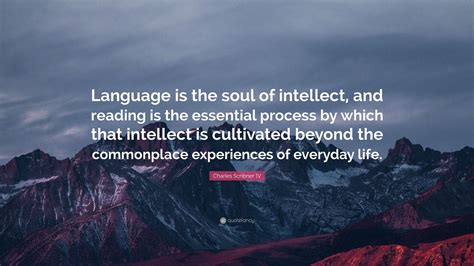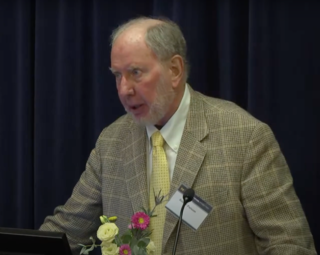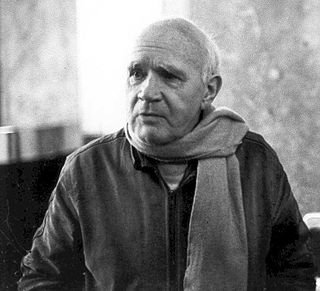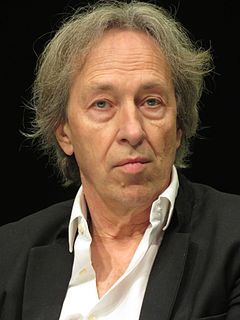A Quote by Charles Scribner IV
Beyond the formative effects of reading on the individuals composing society, the fact that they have read the same books gives them experiences and ideas in common. These constitute a kind of shorthand of ideas which helps make communication quicker and more efficient. That is what we mean when we say figuratively of another person, We speak the same language.
Related Quotes
A society that relies on generalized reciprocity is more efficient than a distrustful society, for the same reason that money is more efficient than barter. Trust lubricates social life. Networks of civic engagement also facilitate coordination and communication and amplify information about the trustworthiness of other individuals.
The psyche is the inward experience of the human body, which is essentially the same in all human beings, with the same organs, the same instincts, the same impulses, the same conflicts, the same fears. Out of this common ground have come what Jung has called the archetypes, which are the common ideas of myths.
I'm reading a lot of different books, but I always think I have to switch it up a little bit. It's like food - everything in moderation, same with my books, same with my reading. You read books that are good for you and you learn a lot of stuff, then you read 'Fifty Shades of Grey,' which is like candy.
What counts, in the long run, is not what you read; it is what you sift through your own mind; it is the ideas and impressions that are aroused in you by your reading. It is the ideas stirred in your own mind, the ideas which are a reflection of your own thinking, which make you an interesting person
If you are resolutely determined to make a lawyer of yourself, the thing is more than half done already. It is but a small matter whether you read with anyone or not. I did not read with anyone. Get the books, and read and study them till you understand them in their principal features; and that is the main thing. It is of no consequence to be in a large town while you are reading. I read at New Salem, which never had three hundred people living in it. The books, and your capacity for understanding them, are just the same in all places.
We sift reality through screens composed of ideas . (And such ideas have their roots in older ideas.) Such idea systems are necessarily limited by language , by the ways we can describe them. That is to say: language cuts the grooves in which our thoughts move. If we seek new validity forms (other laws and other orders) we must step outside language.
A society whose members are united by the fact that they think in the same way in regard to the sacred world and its relations with the profane world, and by the fact that they translate these common ideas into common practices, is what is called a Church. In all history, we do not find a single religion without a Church.
There is this thing called the university, and everybody goes there now. And there are these things called teachers who make students read this book with good ideas or that book with good ideas until that's where we get our ideas. We don't think them; we read them in books. I like Utopian talk, speculation about what our planet should be, anger about what our planet is. I think writers are the most important members of society, not just potentially but actually. Good writers must have and stand by their own ideas.
The ideas of the ruling class are in every epoch the ruling ideas, i.e. the class which is the ruling material force of society, is at the same time its ruling intellectual force. The class which has the means of material production at its disposal, has control at the same time over the means of mental production, so that thereby, generally speaking, the ideas of those who lack the means of mental production are subject to it. The ruling ideas are nothing more than the ideal expression of the dominant material relationships, the dominant material relationships grasped as ideas.
I'm in bed, so to speak, more with those people who consider themselves atheists but who are concerned about the same things, ideas, and politics I'm concerned with than those who claim to be religious in the same way that I am but have no interest in the political reorganization of society, which needs to be talked about from the pulpit.
It by no means follows, that because two men utter the same words, they have precisely the same idea which they mean to express: language is inadequate to the variety of ideas which are conceived by different minds, and which, could they be expressed, would produce a new variety of characteristic differences between man and man.
People who write about issues like poverty or terrorism are a part of the elite, and the distance between the elite and nonelite is growing very fast. You can move around the world but meet only people who speak your language, who share the same ideas, the same beliefs, and in doing so you can lose sight of the fact that the vast majority of the world does not think or believe in or speak the everyday discourse of the elite.
Ideas are very important to the shaping of society. In fact, they are more powerful than bombings or armies or guns. And this is because ideas are capable of spreading without limit. They are behind all the choices we make. They can transform the world in a way that governments and armies cannot. Fighting for liberty with ideas makes more sense to me than fighting with guns or politics or political power. With ideas, we can make real change that lasts.
































